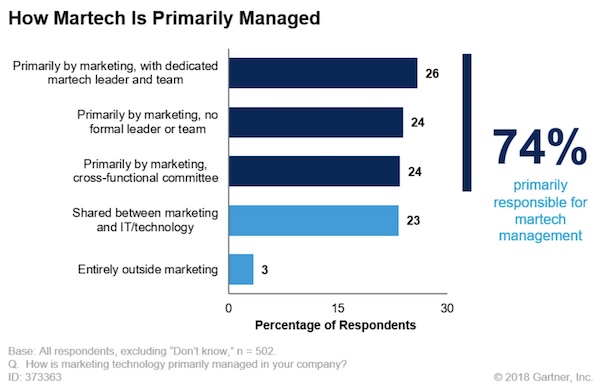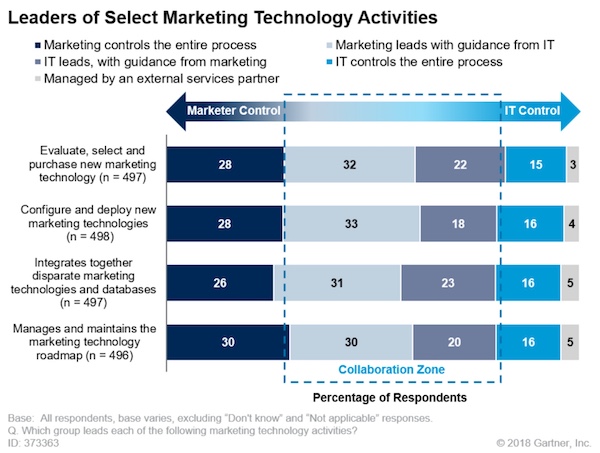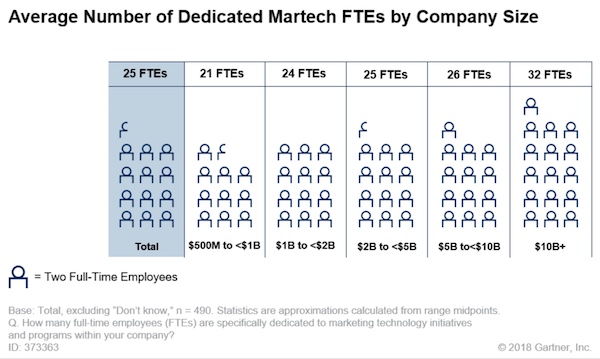As 2018 comes to a close, we can affirm that this was the year that the martech profession crossed into the mainstream. Marketing technologists are no longer unicorns.
I was struck by this anecdotally with the speakers and attendees at the MarTech conference in October. But now I’ve also got some great quantitative data to share with you, compliments of Gartner.
Bryan Yeager and Anna Maria Virzi, two leading analysts in the marketing technology industry, recently produced the 2018 Gartner Marketing Technology Survey of 504 marketing leaders responsible for marketing technology decision-making. (Byran actually presented an awesome early version of their findings at MarTech this fall.)
Their report is packed with great insights on marketing technology management within large organizations (i.e., $500 million in revenue or more). But I want to highlight the evidence showing that, indeed, martech is now a mainstream profession. Let’s start with the chart at the top of the page:
- In 74% of enterprise organizations, martech is primarily managed by marketing.
- The most common pattern — in 26% of all enterprise organizations — is for martech to be primarily managed by marketing, with a dedicated martech leader and team.
I know, “martech is primarily managed by marketing” probably doesn’t sound revolutionary. But it wasn’t that many years ago that any significant technology effort not run primarily by the IT department was inconceivable in most enterprise circles. We’ve crossed a big threshold, and it’s a one-way door. (We’ll see more of this with the ongoing democratization of marketing technology ahead.)
It’s also noteworthy that more than 1/4 of enterprises have a dedicated martech leader and team. It was only 4 years ago that The Rise of the Marketing Technologist was published by Harvard Business Review to considerable skepticism.
What’s remarkable — albeit not surprising — in Gartner’s report is that enterprise marketing teams that run their own technology with a dedicated martech leader are more effective. To quote a few of their findings (emphasis added is mine):
Respondents with a dedicated martech leader and team were more likely to rate their marketing maturity at a higher level than those with cross-functional or leaderless approaches.
Additionally, brands with a martech leader and team said their stack was more effective when compared with companies that take a committee-based approach.
Organizations with a dedicated martech leader have the ability to advance their brand’s overall marketing maturity. This leader helps define the vision and strategic roadmap for martech, and coordinates with and aligns key stakeholders across the business. The martech leader also ensures the marketing organization is well-versed in using internal business tools and understanding prospect and customer journeys across relevant touchpoints.
The End of Martech as “Shadow IT”
When I first started writing about martech a decade ago, marketing technologists working in marketing were often branded as “shadow IT” — not a complimentary label. (As an aside, I remember pushing back against “shadow marketing” in IT and writing a snarky parable of the “chief language officer” to counter that. Yeah, I was a bit of a rabble rouser in those days.)
But as the above chart from the Gartner report reveals, marketing and IT collaborate in the majority of enterprises — even as marketing takes primary responsibility for managing martech. Martech simply isn’t the extreme CMO/CIO dichotomy that it was once painted as.
The most common pattern? “Marketing leads with guidance from IT” in these activities:
- Evaluate, select, and purchase new marketing technology (32%)
- Configure and deploy new marketing technologies (33%)
- Integrate together disparate marketing technologies and databases (31%)
- Manage and maintain the marketing technology roadmap (30%, a tie)
“While marketers often rely on IT for guidance and expertise, it’s rare that IT controls the entire process for martech activities, with no more than 16% of respondents saying they allow full IT control for any outlined function,” stated the report.
“Outsourcing martech activities altogether is also rare, underscoring that most marketers want to play a part in shaping how martech is used within their organization.”
Teams of Marketing Technologists
Marketing technologists are not unicorns. But if they were, they clearly now travel in packs. In Gartner’s survey, the average enterprise has 25 dedicated martech full-time employees (FTEs):
To sum up:
- Marketing primarily manages martech.
- Most commonly, marketing has a dedicated martech leader and team.
- Marketing’s management of martech is done in collaboration with IT.
- Enterprises now have teams of dozens of marketing technologists.
- Running martech this way makes marketing more efficient and effective.
In short: martech is a mainstream marketing profession.






